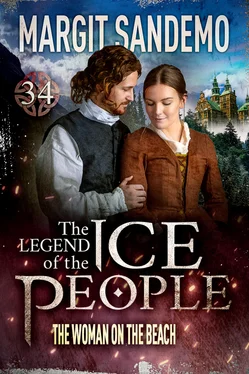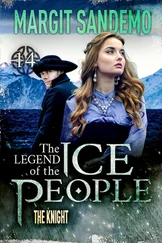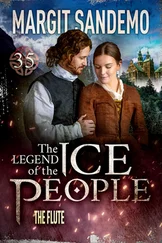“History repeats itself,” murmured Diderik Swerd.
“Yes, certainly. Of course, more keenly than anybody else, the guards directed their spears at the poor girl. Only there weren’t enough of them. So the family and friends of the chosen virgin, young men who might want her for themselves, were forced to take part. The ancient religion was strong and powerful, and those men knew very little about the world outside the village. Many probably believed that there was no other world than Vargaby. What were they to do? Well, at the time when the missionaries were working their way ever more deeply into the forests of Dalarna, something fatal occurred. One of Vret Joar’s guards fell in love with the virgin who had been chosen that year. In his youthful folly, he had admired the mighty Vret Joar and had been willing to serve him. Now he was full of remorse. He tried to escape with the girl, who was probably not a virgin anymore by then, but he was caught. The girl managed to get away and she roamed the forests for a long time. Finally, she made her way to the people of Älvdalen and give birth to a son. She herself lived for only another eight years. The child was, of course, a poor thing, who led a miserable life. He soon vanished from the village, and I presume that he died of starvation.”
“And the guard? The lover?”
“They made short work of him. All the other guards, and the son of the tyrant, Vret Mats, surrounded him and pierced him with their spears.”
The listeners shuddered.
“The girl was one of three sisters. One of them had already been sacrificed the previous year, but the third one was an extremely strong character. She knew that she was the next in line. However, that wasn’t the main reason why she decided to kill the tyrant. It was the sorrowful plight of her two sisters and the thought of the little girls that still lived in the village. She knew that after her, it would be their turn. Small, innocent young girls ...”
The fire was dying down and the peasant’s wife placed some more juniper twigs on it, which crackled. As the fire flared up, she turned around and looked at the faces of the guests in the warm glow: Diderik Swerd’s, cynical and jolly, Mr Natan’s, which was fanatical, and the young follower, who was unfathomable.
Now Gerd is giving her imagination a free rein, thought André with a little smile. This Gerd, who had written this ... Was she married to Ole Knudsen when she wrote it? Hardly! She reminded him a lot of the Brontë sisters: withdrawn, fearfully isolated, but with a creative ability that wouldn’t allow itself to be stifled. Gerd had an aptitude for writing, and for plotting in a rather limited way. She put replies in the mouths of her characters, and visualized how they and their surroundings looked.
There was undoubtedly a grain of truth in her written fantasy. It wasn’t an invented legend. The virgins of Vargaby, or at least the legend about them, must have existed, and her creative talents had supplied the details, the trivialities. André wanted to know whether she had ever thought of writing a book about all this? The little notebook he had in his hand was too thin, the story too short to make a whole book. Wasn’t this the sin that all authors commit? That they didn’t make their episodes long enough?
Perhaps she had even sent it to a publisher? And received a refusal? No, he didn’t believe she would have had the courage to do that.
The peasant, who had waited while his wife was tending to the fire, continued his account: “The girl, who was called Mait, succeeded in tricking Vret Joar Jonsson into coming to the forest lake by making him believe that the god Freyr had appeared to her and that he wanted to speak with Vret Joar alone.”
The peasant lowered his voice: “They say that the idol they had carved of Freyr was pretty fruity ...”
“Husband!” said the wife. “You mustn’t talk of such things!”
Diderik, leaning forward with an expectant, lustful smile, said: “Yes, let’s hear it.”
The peasant wriggled and writhed and didn’t quite know which of them to listen to. “Well, you gentlemen know how Freyr was equipped. He was the god of fertility, after all. They say that Vargaby’s idol was so well endowed that ... yes, yes, wife, I’ll keep quiet.
“Ah well, when Vret Joar arrived unarmed at the forest lake, Mait stepped out of the forest with a big knife in her hand to kill the village scourge. But she made the mistake of wanting to lecture him on what sort of scum he was. Of course, he ran off into the forest, because an indignant and armed Mait was no laughing matter. She chased him, and as she was younger and in better health, she had just about caught up with him – when at that very moment the missionaries coming through the forest were about to pass the lake.
“Of course, Vret Joar had heard about the new religion that had come to the nation. He wasn’t keen on it, but now he saw his salvation. He very loudly accused Mait of being a witch, who wanted to bewitch him. Vret Joar knew perfectly well that all kinds of sorcery were obnoxious to the men who believed in Christianity. The missionary signalled to his men and before Mait had had time to realize what was happening, they had killed the ‘sorceress’ in the name of God.
“Vret Joar went to Vargaby with his rescuers, pretending that he was a follower of the new creed. However, very soon the missionaries got to hear of the atrocities he had committed, including the human sacrifices. Having killed his vassals, the guards, the missionaries chased Vret Joar Jonsson and his son, Vret Matts Joarsson, out of the village and into the forest. The hunt was harsh and brutal. Nevertheless, the two men, father and son, managed to reach inhabited areas. The flight through the forest took its toll on Vret Joar, who died in his son’s arms by the banks of Lake Siljan. What happened to Vret Matts is also known. He became a vagabond, who drank, whored, starved and died pretty young.”
“What about Vargaby?”
“The missionaries tried to introduce Christianity to the villagers. When this didn’t work, they torched several of the houses in this ‘pagan nest’ so that the inhabitants had to rebuild them.”
Everybody in the room was silent.
“Do the people still live there?” asked Diderik shortly.
“Yes, they do. Once a year we see just a few of them in church. Shy and silent, they step aside for people, and then return to their hidden meadows once more.”
“I see ... But you still haven’t told us. What is it that’s so dangerous about that forest?”
The peasant lifted his head. “Haven’t you grasped it? The virgins of Vargaby are still there. The people of the village go free and don’t see the spirits. But a stranger who enters the forest ... He’s led onto the hidden pathway to Vargaby.”
Diderik’s mouth curled in disgust: “Why?”
“Because the virgins are still searching for Vret Joar Jonsson and perhaps also his son. But above all for Joar. How do spirits know that a man died several centuries ago? They are still searching. Full of the thirst for revenge. Especially Brants Mait, but also her sisters. The other little girls, the first to be sacrificed, seem to have found peace. Nobody speaks about them anymore.”
“But they can’t make contact with the living?”
“No, not in a tangible way. They can only frighten them out of their senses so that they can’t find their way out of the forest.”
“Has this ever happened? That somebody never made their way out of the forest?”
“I don’t know. After all, it’s a legend. However, my wife and I don’t go near those parts.”
Natan breathed out. “What an extremely realistic and detailed legend. A bit too precise. How can anybody know so much, especially as you’ve never been there. And as nobody has escaped from the forest alive?”
Читать дальше












